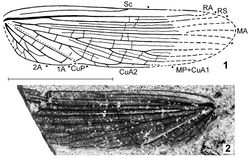Difference between revisions of "Alexarasnia"
m (Imported from ZooKeys) |
m (1 revision) |
(No difference)
| |
Latest revision as of 11:42, 24 September 2011
| Notice: | This page is derived from the original publication listed below, whose author(s) should always be credited. Further contributors may edit and improve the content of this page and, consequently, need to be credited as well (see page history). Any assessment of factual correctness requires a careful review of the original article as well as of subsequent contributions.
If you are uncertain whether your planned contribution is correct or not, we suggest that you use the associated discussion page instead of editing the page directly. This page should be cited as follows (rationale):
Citation formats to copy and paste
BibTeX: @article{Gorochov2011ZooKeys130, RIS/ Endnote: TY - JOUR Wikipedia/ Citizendium: <ref name="Gorochov2011ZooKeys130">{{Citation See also the citation download page at the journal. |
Familia: Alexarasniidae
Name
Alexarasnia Gorochov gen. n. – Wikispecies link – ZooBank link – Pensoft Profile
Type species
Alexarasnia rossica sp. n.
Description
Tegmen (Figs 1, 2) moderately narrow, with parallel Sc, RA, RS, branches of MA and MP+CuA1, and short distal part of CuA2; all areas between longitudinal veins more or less narrow; majority of them with intercalary veins; Sc slightly concave, without branches and with apex situated near middle part of costal edge; R+RA slightly convex, but all longitudinal veins between this vein and CuP neutral; R and MA with proximal bifurcation situated in proximal part of tegmen; RA and RS probably simple (single); MA with only two branches in proximal and middle parts of tegmen; proximal part of MP before anastomosis with CuA1 indistinct; MP+CuA1 with four branches as minimum; CuA2 with two branches forming cell-like structure looking as a result of fusion of their distal parts; CuP concave (area near this vein with distinctly concave fold shown in Fig. 1a by dotted line), oblique and straight, but with small distal part probably looking as a result of its fusion with CuA2; 1A hardly convex, similar to CuP in shape; 2A neutral, looking as a single, oblique, and straight vein (its branches somewhat similar to crossveins); true crossveins simple and sparse.
Included species
Only the type species.
Etymology
The genus is named in honor of the famous Russian paleoentomologist Prof. Alexandr P. Rasnitsyn.
Original Description
- Gorochov, A; 2011: A new, enigmatic family for new genus and species of Polyneoptera from the Upper Permian of Russia ZooKeys, 130: 131-136. doi
Images
|
